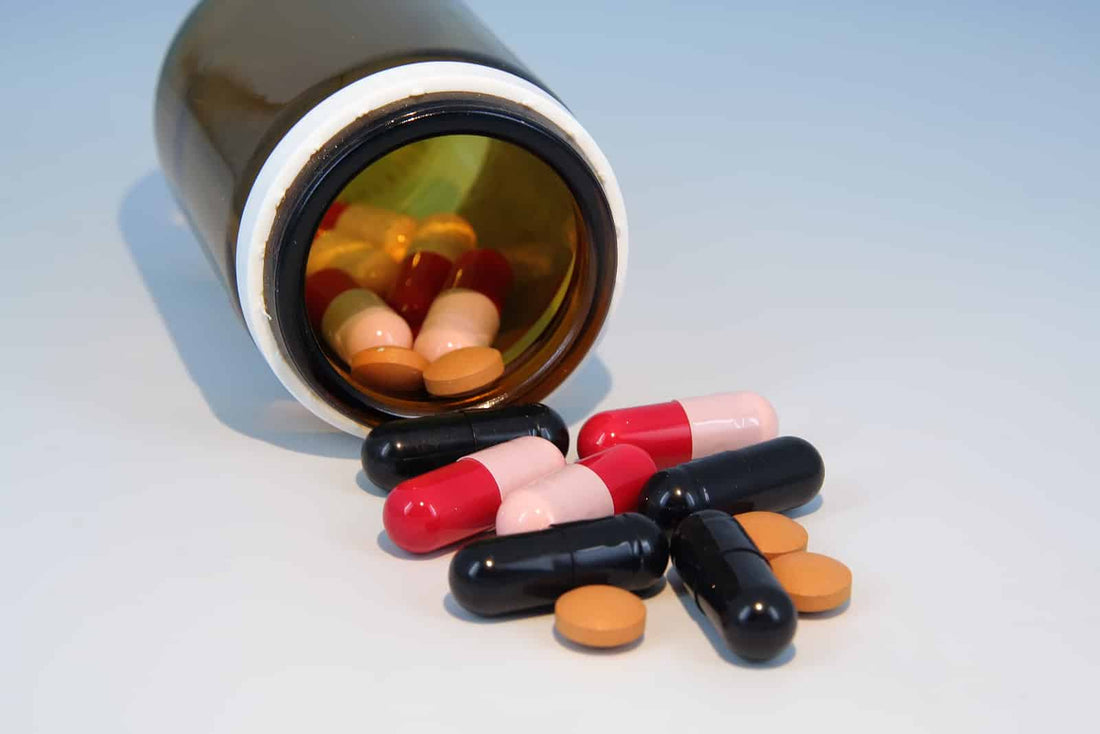There’s no getting around it. At some point in your life, you might need to take antibiotics to help fight off an infection or illness.
Antibiotics were developed after the accidental discovery of penicillin in 1928 by Professor Alexander Fleming (1). This type of medication can help keep harmful bacteria from spreading. The bad news is, it can also hurt the good bacteria in your body.
Gut health is taking center stage in the health world, and for good reason. Did you know that your microbiome is made up of 39 trillion bacteria and other microbes (2)? These tiny things are necessary in order to live optimally. Which is why we have to consider the factors that may impact these tiny microbiomes & our overall health.
Once you’ve finished a round of antibiotics, your body is left with the aftermath - for better or worse.
What are some ways you can support your gut health after taking antibiotics? By the time you’ve finished this article, you’ll have a better understanding of the role antibiotics play, the downside to certain types, and ways you can help your body heal afterwards.
How Antibiotics Work
Research shows that antibiotics work to break up the cycle of the bacteria, preventing them from spreading or multiplying. This enables your immune system to better tackle the foreign invaders.
However, certain types of antibiotics such as tetracyclines and macrolides (3) have been known to wipe out all bacteria – both good and bad.
And if the good bacteria is lacking, you’re left susceptible to GI issues, mood disruptions, and more.
Foods to Support Gut Health After Antibiotics
The best thing you can do for yourself is to eat foods high in nutritional value. This is especially true when it comes to restoring your microbiome after antibiotics.
Some of the best foods that help heal your gut are:
- Bone broth: The broth made from slow-boiled bones contains collagen, gelatin, and glutamine. These ingredients can help repair the gut lining, and soothe inflammation (4).
- Aloe Vera juice: This desert plant contains a gelatinous interior that has been used medicinally for centuries. Some research suggests it can help with ulcers and other GI issues like irritable bowel syndrome (5).
- Fermented foods: Foods that have undergone a special process called fermentation are full of probiotics (6). Examples include yogurt, kimchi, saukraut, kombucha, and kefir.
Foods to avoid: Try to stay away from sugary foods or simple carbohydrates. These choices can lower the number of healthy bacteria in your gut, leading to health conditions like leaky gut syndrome (7).
Probiotics for Gut Health After Antibiotics
Managing a healthy microbiome means zooming out and seeing the big picture. This includes the triune of prebiotics, probiotics, and postbiotics.
- Prebiotics: There are certain fruits and vegetables that contain fiber that act as a food source for probiotics. Your gut takes these prebiotic fibers and turns them into short-chain fatty acids. These fatty acids then act as a barrier, protecting the lining in your intestinal lining. It essentially keeps the cells tight knit, preventing foreign objects from crossing into the rest of your body (8).
- Probiotics: Probiotics are a type of beneficial bacteria. These microorganisms are found both in the gut and in certain foods (9). Billions of these live probiotic strains can also be included in supplements, which is helpful for those who don’t get enough through diet alone.
- Postbiotics: When the probiotics finish breaking down the prebiotic fibers, nutrients like vitamin K and B vitamins are left to continue nourishing the body. These are known as postbiotics (10).
Want to make it easy and get all 3-in-1? Check out KaraMD GutBio Max here (11).
Liver Support After Antibiotics
While placing your primary focus on healing your gut isn’t wrong, we can’t forget about another important organ: your liver.
Your liver does many things, from detoxing to cleaning up waste. It’s never a bad idea to take an extra step to make sure your liver is taken care of.
Ways to do this include (12):
- Drinking plenty of water
- Eating foods like beets, carrots, avocados or leafy greens
- Avoiding alcohol
- Taking herbs like milk thistle*
*Always check with your healthcare provider before starting a supplement regimen.
Conclusion
There will always be things in life we can’t control, and getting sick is one of them.
Antibiotics may have come about accidentally, but their discovery has changed the way the medical community operates.
Certain kinds of antibiotics have been known to destroy all bacteria, so it’s important to keep that in mind as you finish out your prescription.
Eating foods rich in probiotics and taking a full spectrum microbiome supplement can go a long way in helping you recover from short or long term antibiotic use.
It’s also a great practice to have every day, regardless of your current health status!
Learn more about how KaraMD is changing the game in the area of probiotic supplements here (11).
References
1. https://www.ncbi.nlm.nih.gov/pmc/articles/PMC4520913/
2. https://www.sciencefocus.com/the-human-body/human-microbiome/
3. https://www.nature.com/articles/s41586-021-03986-2
4. https://link.springer.com/article/10.1007/s00726-014-1773-4
5. https://www.ncbi.nlm.nih.gov/books/NBK92765/
6. https://www.health.harvard.edu/blog/fermented-foods-for-better-gut-health-2018051613841
7. https://www.ncbi.nlm.nih.gov/pmc/articles/PMC7284805/
8. https://health.clevelandclinic.org/what-are-prebiotics/
9. https://my.clevelandclinic.org/health/articles/14598-probiotics
10. https://link.springer.com/article/10.1007%2Fs00394-017-1445-8
11. https://karamd.com/products/gutbio-max
12. https://www.hosmerchiropractic.com/4-ways-restore-gut-antibiotics/
††This noted statement is based on independent research and is not necessarily the opinion of the author
